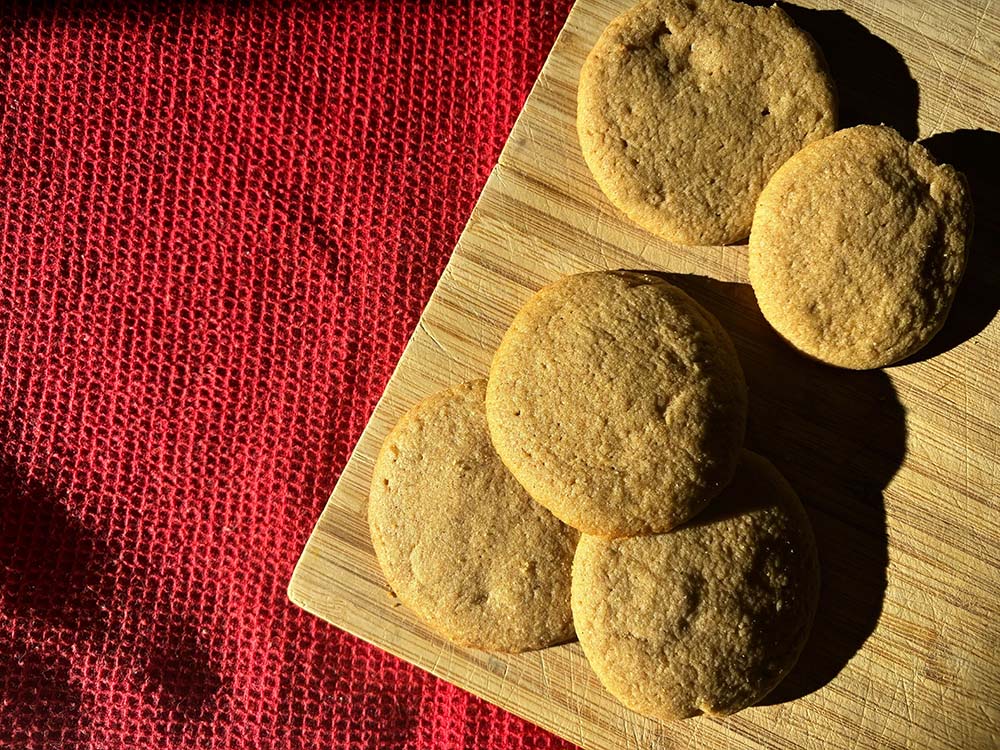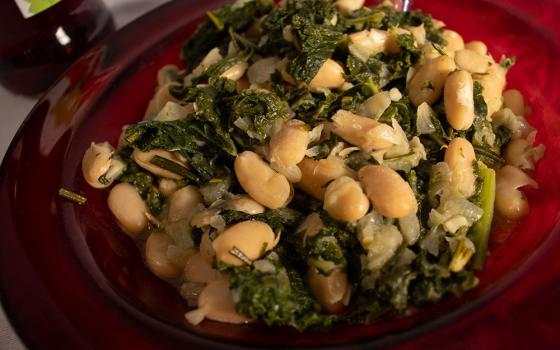
"Cookies of Joy" made by Olivia Bardo this Advent (NCR photo/Olivia Bardo)
Part mystic, healer, and writer, St. Hildegard was uniquely concerned with aligning one's physical and spiritual well-being. The 12th-century saint who composed music and created her own language, also wrote poetry and books with recipes and remedies for common ailments.
And in between the tangible and ethereal elements of her writings she included a cookie recipe.
Her recipe for cookies spiced with cinnamon, nutmeg and cloves has developed a lore of its own in the millennium since she first crafted the recipe. Known as her "cookies of joy," they are said to "calm all bitterness of the heart and mind, open your heart and impaired senses, and make your mind cheerful," according to her writings in Physica. She instructs her readers, "Eat them often."
In this Christmas season, I can't help but feel like we need to revive these cookies of joy.
We have many individual and collective grievances as the year grows dim. Hildegard seems to have understood something that we have forgotten in the last millennium. Maybe her cookies don't actually cure sadness, but I think they remind us of something supremely important. She seems to have understood that in the midst of discouragement, sometimes we just need a sweet treat, or even a nap. This year, I'm taking my cues from her.
Wendell Berry writes in his poem "The Peace of Wild Things" that "when despair for the world grows in me ... I go and lie down where the wood drake rests in his beauty on the water, and the great heron feeds."
Advertisement
When despair for the world grows in me, I go to the kitchen, where I can take all my tangled thoughts and turn them into a recipe. I respond to hopelessness with baking and it carries me forward. Sure, the solutions to the world's problems aren't solely found in my recipe for stollen, a German Christmas bread, but having something prepared for guests is part of that restorative work.
I felt the weight of December as the winter solstice, the longest night of the year, grew closer and closer. Baking helped me find my way back and helped me to remember that the light will return. Although the year is nearly at its darkest before December draws to a close, the light begins its steady pace of growing closer again.
Like Hildegard, I'm in my own pursuit of marrying the spiritual and commonplace. I found a mystical rhythm in the kitchen. It's a place where my hands are crafting something nourishing, rather than something harmful. Baking is an act of creativity and generosity. It is time spent with the Divine. As I knead bread dough, my hands match the rhythm of my breathing. My bread-baking rituals often include me standing barefoot in the kitchen, rolling up my sleeves and singing the Doxology.
Lately, I've been baking my way through Advent and finding recipes that reflect the produce that's in season around me. It helps to recalibrate my internal compass toward both the natural and liturgical seasons. Throughout Advent in particular, something holy takes place in the kitchen.
Throughout the season, I have tried to bring traditions and memories of my German grandmother in the kitchen with me. I've made springerle cookies, which feature intricate, raised patterns that often tell stories from the Christian faith tradition. Mine are pressed with patterns of edelweiss flowers and St. Nicholas.
When the cookies emerge from the oven, they almost look too beautiful to eat. Yet having something so delicately lovely, made just for you to eat, is a kind of gift. I think that's part of what Hildegard was getting at with her cookies of joy.
Ecclesiastes 9:7 reminds us to "go, eat your bread with enjoyment and drink your wine with a merry heart, for God has long ago approved what you do." We dismiss the practice of baking as a frivolity, but there's a true transformation that happens in the kitchen. A collection of ingredients can become something entirely new. The very act of that thing being given to others is another kind of transformation.
Baking is a wonderful representation of Advent itself. Just as we await the sweet thing that's rising in the oven, in the Advent season, we keep watch for the long-awaited arrival of Christ. Just as yeast must ferment to make sourdough, we must wait with anticipation for the right season. The waiting that precedes is part of what makes the gift so miraculous. There's a steadying power in remaining hopeful in the dark. Perhaps that's exactly what we've been craving: receiving a gift we were not expecting.
I choose softness when the world expects cruelty. While the schemes of the world seek to bring despair, let me stir cranberries into my scone dough, shape them and dust them with sugar. The light of Advent grows brighter, and my oven keeps its steady warmth as something sweet slowly turns golden inside.






